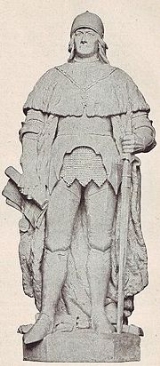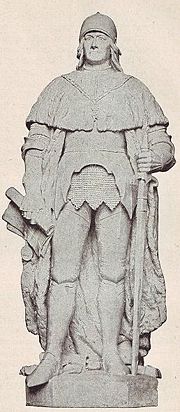
Frederick II, Elector of Brandenburg
Encyclopedia
Frederick II of Brandenburg (19 November 1413 – 10 February 1471), nicknamed "the Iron" (der Eiserne) and sometimes "Irontooth" (Eisenzahn), was a Prince-elector
of the Margraviate of Brandenburg
from 1440 until his abdication in 1470, and was a member of the House of Hohenzollern
.

to Frederick I
, Brandenburg's first Hohenzollern ruler, and his wife Elizabeth, daughter of Frederick, Duke of Bavaria-Landshut, and Maddalena Visconti
. The latter was a daughter of Bernabò Visconti
and Beatrice della Scala. As the second son, his brothers included John the Alchemist
and Albert Achilles, both of whom also ruled Brandenburg as margrave
s.
In 1421, at age 8, Frederick was betrothed to Princess Jadwiga of Lithuania, but she died on 8 December 1431, before the marriage could take place, purportedly poisoned by her stepmother Sophia of Halshany
.
When Frederick I retired in 1437, he compensated his incapable eldest son John with the Principality of Bayreuth
while Frederick II assumed the government of Brandenburg. Unlike his father, he turned away from imperial politics and concentrated on his efforts to pacify the nobility and towns
of the electorate. Quarrels with the city of Berlin
began in 1440 with his plans to build a new residence on the Cölln
island of the Spree
river. In 1448 the Berliner Unwille (indignation) against the cession of the city's territory for an electoral stronghold culminated in open revolt, when the citizens flooded the excavation of the future Stadtschloss. Nevertheless Frederick II prevailed, had the palace built and the city's rights
decisively curtailed.
In 1454 and 1455, he concluded the Treaties of Cölln and Mewe
and thereby re-gained the Neumark
(New March) from the Teutonic Order state. Weary of the long struggle with the Duchy of Pomerania
, he abdicated in 1470 in favour of his younger brother Albert Achilles, he retired to the Bayreuth Principality and died one year later in Neustadt an der Aisch
.
of Saxony
(1421 - August 23, 1476), a daughter of Elector Frederick I of Saxony
and Katharina of Brunswick-Lüneburg
. They had four children:
|-
|-
Prince-elector
The Prince-electors of the Holy Roman Empire were the members of the electoral college of the Holy Roman Empire, having the function of electing the Roman king or, from the middle of the 16th century onwards, directly the Holy Roman Emperor.The heir-apparent to a prince-elector was known as an...
of the Margraviate of Brandenburg
Margraviate of Brandenburg
The Margraviate of Brandenburg was a major principality of the Holy Roman Empire from 1157 to 1806. Also known as the March of Brandenburg , it played a pivotal role in the history of Germany and Central Europe....
from 1440 until his abdication in 1470, and was a member of the House of Hohenzollern
House of Hohenzollern
The House of Hohenzollern is a noble family and royal dynasty of electors, kings and emperors of Prussia, Germany and Romania. It originated in the area around the town of Hechingen in Swabia during the 11th century. They took their name from their ancestral home, the Burg Hohenzollern castle near...
.

Biography
Frederick II was born in TangermündeTangermünde
Tangermünde is a town in the district of Stendal, in the northeastern part of Saxony-Anhalt, Germany. It is situated on the Elbe river in the Altmark region.-History:Tangermünde can look back at an 1000-year history...
to Frederick I
Frederick I, Elector of Brandenburg
Frederick was Burgrave of Nuremberg as Frederick VI and Elector of Brandenburg as Frederick I. He was a son of Burgrave Frederick V of Nuremberg and Elisabeth of Meissen, and was the first member of the House of Hohenzollern to rule the Margraviate of Brandenburg.- Biography :Frederick entered...
, Brandenburg's first Hohenzollern ruler, and his wife Elizabeth, daughter of Frederick, Duke of Bavaria-Landshut, and Maddalena Visconti
Maddalena Visconti
Maddalena Visconti was a daughter of Bernabò Visconti and his wife Beatrice Regina della Scala. Maddalena was Duchess of Bavaria-Landshut by her marriage to Frederick, Duke of Bavaria.- Family :...
. The latter was a daughter of Bernabò Visconti
Bernabo Visconti
Bernabò Visconti was an Italian soldier and statesman, who was Lord of Milan.-Life:He was born in Milan, the son of Stefano Visconti and Valentina Doria. From 1346 to 1349 he lived in exile, until he was called back by his uncle Giovanni Visconti...
and Beatrice della Scala. As the second son, his brothers included John the Alchemist
John, Margrave of Brandenburg-Kulmbach
John, nicknamed the Alchemist was a Margrave of Brandenburg-Kulmbach and served as the peace-loving Margrave of Brandenburg after the abdication of his father, Frederick I, the first member of the House of Hohenzollern to rule Brandenburg.-Biography:John was the eldest son of Frederick I,...
and Albert Achilles, both of whom also ruled Brandenburg as margrave
Margrave
A margrave or margravine was a medieval hereditary nobleman with military responsibilities in a border province of a kingdom. Border provinces usually had more exposure to military incursions from the outside, compared to interior provinces, and thus a margrave usually had larger and more active...
s.
In 1421, at age 8, Frederick was betrothed to Princess Jadwiga of Lithuania, but she died on 8 December 1431, before the marriage could take place, purportedly poisoned by her stepmother Sophia of Halshany
Sophia of Halshany
Sophia of Halshany , was a Lithuanian princess of Halshany, Queen of Poland from , and the last wife of Jogaila.-Biography:...
.
When Frederick I retired in 1437, he compensated his incapable eldest son John with the Principality of Bayreuth
Principality of Bayreuth
The Principality of Bayreuth or Brandenburg-Bayreuth was a reichsfrei principality in the Holy Roman Empire centered on the Bavarian city of Bayreuth. Until 1604 its capital city was Kulmbach; then the margraves used their palaces in Bayreuth as their residence...
while Frederick II assumed the government of Brandenburg. Unlike his father, he turned away from imperial politics and concentrated on his efforts to pacify the nobility and towns
German town law
German town law or German municipal concerns concerns town privileges used by many cities, towns, and villages throughout Central and Eastern Europe during the Middle Ages.- Town law in Germany :...
of the electorate. Quarrels with the city of Berlin
Berlin
Berlin is the capital city of Germany and is one of the 16 states of Germany. With a population of 3.45 million people, Berlin is Germany's largest city. It is the second most populous city proper and the seventh most populous urban area in the European Union...
began in 1440 with his plans to build a new residence on the Cölln
Cölln
In the 13th century Cölln was the sister town of Old Berlin , located on the southern Spree Island in the Margraviate of Brandenburg. Today the island is located in the historic core of the central Mitte locality of modern Berlin...
island of the Spree
Spree
The Spree is a river that flows through the Saxony, Brandenburg and Berlin states of Germany, and in the Ústí nad Labem region of the Czech Republic...
river. In 1448 the Berliner Unwille (indignation) against the cession of the city's territory for an electoral stronghold culminated in open revolt, when the citizens flooded the excavation of the future Stadtschloss. Nevertheless Frederick II prevailed, had the palace built and the city's rights
Town privileges
Town privileges or city rights were important features of European towns during most of the second millennium.Judicially, a town was distinguished from the surrounding land by means of a charter from the ruling monarch that defined its privileges and laws. Common privileges were related to trading...
decisively curtailed.
In 1454 and 1455, he concluded the Treaties of Cölln and Mewe
Treaties of Cölln and Mewe
The Treaties of Cölln and Mewe, concluded in 1454 and 1455, transferred the Neumark from the Teutonic Order state to the Electorate of Brandenburg. The Teutonic Knights had received the area as a pawn from Brandenburg in 1402, and as a possession in 1429...
and thereby re-gained the Neumark
Neumark
Neumark comprised a region of the Prussian province of Brandenburg, Germany.Neumark may also refer to:* Neumark, Thuringia* Neumark, Saxony* Neumark * Nowe Miasto Lubawskie or Neumark, a town in Poland, situated at river Drwęca...
(New March) from the Teutonic Order state. Weary of the long struggle with the Duchy of Pomerania
Brandenburg-Pomeranian conflict
Starting in the 12th century, the Margraviate, later Electorate of Brandenburg was in conflict with the neighboring Duchy of Pomerania over frontier territories claimed by both Brandenburg and Pomerania, and over the status of the Pomeranian duchy, which Brandenburg claimed as a fief, whereas...
, he abdicated in 1470 in favour of his younger brother Albert Achilles, he retired to the Bayreuth Principality and died one year later in Neustadt an der Aisch
Neustadt an der Aisch
Neustadt an der Aisch is a small town in the northern part of Bavaria , within the Franconian administrative region Middle Franconia,...
.
Family and children
On 11 June 1441, Frederick II married CatherineCatherine of Saxony, Electress of Brandenburg
Catherine of Saxony was a princess of Saxony by birth and Electress of Brandenburg by marriage.- Life :Catherine was a daughter of the Elector Frederick I of Saxony from his marriage to Catherine of Brunswick-Lüneburg , daughter of Duke Henry I, Duke of Brunswick-Lüneburg.On 11 June 1441...
of Saxony
Electorate of Saxony
The Electorate of Saxony , sometimes referred to as Upper Saxony, was a State of the Holy Roman Empire. It was established when Emperor Charles IV raised the Ascanian duchy of Saxe-Wittenberg to the status of an Electorate by the Golden Bull of 1356...
(1421 - August 23, 1476), a daughter of Elector Frederick I of Saxony
Frederick I, Elector of Saxony
Frederick IV of Meissen and Elector of Saxony was Margrave of Meissen and Elector of Saxony from 1381 until his death. He is not to be confused with his cousin Frederick IV, Landgrave of Thuringia, the son of Balthasar, Landgrave of Thuringia...
and Katharina of Brunswick-Lüneburg
Catherine of Brunswick-Lüneburg
Catherine of Brunswick-Lüneburg was a member of the House of Welf, a princess of Brunswick-Lüneburg and by marriage, the Electress of Saxony.- Life :...
. They had four children:
- Dorothea of BrandenburgDorothea of Brandenburg, Duchess of Saxe-LauenburgDorothea of Brandenburg was a princess of Brandenburg by birth and by marriage Duchess of Saxe-Lauenburg.- Life :...
(c. 1446 - March, 1519), married Duke John V of Saxe-Lauenburg on 12 February 1464. - Margaret of BrandenburgMargaret of Brandenburg (1450-1489)Margaret of Brandenburg was a princess of Brandenburg by birth and by marriage Duchess of Pomerania.- Life :...
(c. 1450 - 1489), married Bogislaw X, Duke of PomeraniaBogislaw X, Duke of PomeraniaBogislaw X of Pomerania, the Great, was Duke of Pomerania from 1474 until his death in 1523.Bogislaw was born in Rügenwalde into the House of Pomerania . His father was Eric II, Duke of Pomerania-Wolgast, his mother was the duchess Sophia of Pomerania, both distant relatives of the House of...
. - John of Brandenburg (1452–1454).
- Erasmus von Brandenburg (c. 1453 - 1465).
Ancestors
|-
|-

